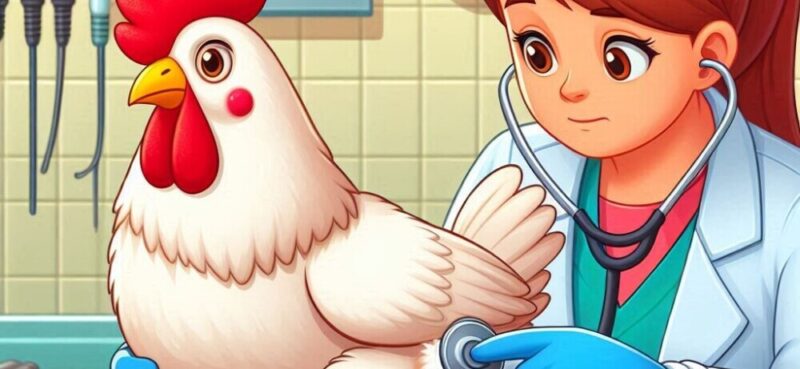
Vent gleet might sound like a strange term to most, but it’s something to watch for chicken keepers. So, what exactly is vent gleet?
It’s a condition that can be caused by yeast, fungi, bacteria, protozoa, parasites, etc. The infection affects chickens’ vent area and cloaca, causing discomfort and potential health issues if not addressed.
An indication that one or more of your flock has it is a foul-smelling, slimy ooze coming from the vent and sticking to the feathers around the vent area.
Spotting the early symptoms can make a world of difference. Look for signs like a dirty and wet backside, swelling around the vent, and a bad odor. These symptoms can often be mistaken for other conditions, so careful observation is key.
What other symptoms, you ask? Prolapsed vent, egg binding, and salpingitis, to name a few.
If left untreated, the infection in the cloaca can travel further into a chicken’s internal organs causing all sorts of problems including death.
Knowing the causes helps in taking preventive measures. Poor coop hygiene, an unbalanced diet, and high-stress environments are common culprits. Garbage in, garbage out—unhealthy inputs for the birds often lead to unhealthy outcomes.
Vent gleet isn’t just discomfort for the chickens; it impacts their egg production and overall well-being. Healthy chickens lay better eggs and live happier lives, making your chicken coop a more productive and pleasant place. Handling these issues early ensures your flock stays in top shape.
Preventing Vent Gleet in Your Flock
Keeping vent gleet at bay starts with prevention. It’s all about maintaining a clean, stress-free environment for your chickens. A clean coop is non-negotiable. Regular cleaning prevents not only vent gleet but also other common poultry diseases.
Diet plays a massive role in keeping your chickens healthy. Ensure they get balanced nutrition with the right mix of proteins, grains, and greens. Adding probiotics to their diet can help promote a healthy gut, making them more resistant to infections like vent gleet.
Stress management is equally important. Chickens aren’t just egg-laying machines. They’re living creatures that need a calm environment. Minimize disturbances, keep noise levels down, and ensure they have enough space to roam.
Regular checks and observations can catch early signs of stress or illness. Observing your chickens daily helps you notice any changes in behavior or appearance quickly, allowing for prompt action and prevention of illnesses like vent gleet.
Treatment Options for Vent Gleet
Various treatments can get your chickens back on their feet. Antifungal medications are the go-to for tackling this pesky infection. Make sure they’re suitable for poultry, and always follow the instructions carefully.
After cleaning your chicken’s bottom with warm, soapy water, applying Povidone Iodine (such as Betadine) is a good antibacterial to knock down a possible cause of cloacitis.
Natural remedies, like apple cider vinegar and plain yogurt, can offer support alongside traditional treatments. They help by balancing the gut flora, boosting your chickens’ natural defenses against infections.
Safety is key. Administer treatments carefully, ensuring your chickens remain calm and comfortable. Be gentle and patient, especially when applying topical treatments around the sensitive vent area.
Sometimes, professional help is the best option. A vet can provide personalized advice and treatment plans tailored to your flock’s needs. Don’t hesitate to call in the experts if at-home efforts aren’t working.
Reliable sources for treatments include poultry supply stores and veterinarian offices. Purchasing from trusted vendors is crucial to ensure quality and effectiveness, giving your chickens the best chance at a speedy recovery.
Building a Long-term Health Strategy for Your Chickens
Crafting a holistic health plan for your flock goes beyond just dealing with immediate issues like vent gleet. It’s about ensuring their long-term well-being, which means consistent monitoring and adjustments based on their health needs.
Regular health checkups are essential. They help catch potential issues before they become severe. A good practice is to keep a health log for your chickens, noting any changes in their behavior or physical condition. Ideally, you won’t need to use it very often.
Prevention is so much more than a clean coop and balanced diet. It’s about understanding your flock’s unique needs and adjusting as they age, ensuring they get the proper nutrients from chicks to full-grown hens or roosters.
Education plays a huge role in successful chicken keeping. Stay informed about common health issues, effective treatments, and preventive measures. This knowledge equips you to make informed decisions that benefit your flock.
There’s a community of chicken keepers out there, and tapping into this network can provide additional support and resources. Online forums (Backyard Chickens), local poultry clubs, and workshops are great places to share experiences, ask questions, and learn from others’ expertise.
I hope this helps. In the comments below, let me know if I can answer any questions for you. I’m always happy to help.
Dave

Chickenmethod.com

